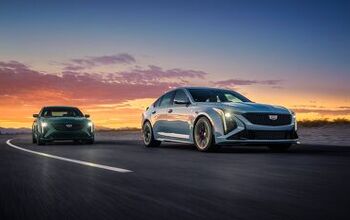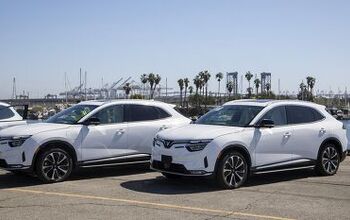Marchionne & Co.: Style Will Be Essential in the Vanilla Future We've All Been Promised

The future is going to be absolutely terrible. Everything is going to be so sterile and automated that humans won’t have anything to do between mealtimes but eagerly anticipate their own death.
At least, that’s the picture being painted by experts. We’re probably further out from autonomous cars, world peace, and robotic butlers than society’s “thinkfluencers” want to admit, but be that as it may, the times are changing and some of this is coming down the pipe.
Automakers are all about the “nextification” of the industry; always promising technological marvels at an accelerated rate. However, Fiat Chrysler Automobiles CEO Sergio Marchionne now claims most visions of the future lack an essential element — any semblance of style.
He probably has a point. While General Motors may be leading the way in terms of autonomous development, its Cruise AV is about as exciting as having athlete’s foot. But we don’t have to wait until all cars become self-driving for them to become dull. As manufacturers continue providing desirable equipment as standard features, style will become the only thing an automaker has left to offer, according to Marchionne.
At last month’s North American International Show, Marchionne said Alfa Romeo wouldn’t truly hit its stride until 2022, and keep going from there. The reason for this, he claimed, comes down to mainstream brands losing their identities. Marchionne says the future will belong to brands with a strong selfhood.
“Generic brands, on the other hand, will have a tough time because then they become indistinguishable, and if they become commoditized, then the price will give you everything that matters,” the CEO said.
Fiat Chrysler probably owns some of the most easily distinguishable brands on the market right now, though not all of them are shining beacons of success. In 2017, Dodge’s domestic sales were the lowest they’ve been since the recession, and the same is true for Chrysler. Meanwhile, Fiat is one of the most recognizable brands currently in North America, and it just suffered the worst sales year since its 2011 reintroduction. Jeep also had a lackluster year, backsliding quite a bit after six years of impressive growth. While Alfa Romeo and Maserati both saw increases in U.S. sales for 2017, neither are what you might call high-volume brands.
Taking all of that into account leaves us wondering if Marchionne is simply expelling hot air to appease investors, or if he actually has a valid point. According to Mike Bernacchi, a marketing professor at the University of Detroit Mercy, his theory holds water — at least on a long enough timeline.
“I certainly hold the position that the idea of a brand and brand names are key,” Bernacchi told the Detroit Free Press in an interview. “Once you lose your identity, you lose a major reason for purchasing.”
“Everybody wants to be ahead, but they better not lose their distinctiveness of the brand,” he continued, noting that the shift to autonomy could risk the individual nature of autos. “If generic ever becomes a [capital] G in the industry, the industry is in trouble.”
Tim Kuniskis, who was recently promoted to head of Alfa Romeo and Maserati, claims standout cars continue to sell against “vanilla A-to-B commoditized sedans.” Kuniskis oversaw the launch of the Dodge Challenger SRT Demon and noted that the Challenger actually increased slightly in 2017. While that’s great for Dodge, which sold 64,537 examples of the auto in the U.S. last year, Honda still moved 322,655 Accords in the same timeframe — a vanilla A-to-B commoditized sedan.
“[Do] you want to buy a midsized sedan that is $28,000 to $30,000 that gets 36 miles per gallon and you’re going lose it in the mall parking lot, or do you want to buy a 300-horsepower V6 … that is $28,000, gets 31 miles per gallon and the difference of 5 miles per gallon, on a 12,000-mile-a-year car, is going to be dollars per month. And you’re going to have the kickass red one with the spoiler and the 20-inch wheels. I’ll take that one,” Kuniskis said.
I’d probably want the more fun car too, just not so gaudy and red — but I’m not the average consumer. I’m the wrong age, the wrong gender, have the wrong income, wrong level of education, and I don’t own my home. I am an outlier.
Style is certainly an important aspect of what makes individual vehicles desirable; Toyota wouldn’t find itself in a massive effort to inject some visual excitement into its models were that not the case. However, I remain unconvinced that the average American isn’t at least as concerned with a getting a good deal on a practical car as they are about hot looks and performance.
Maybe things will totally change if automakers ever figure out how produce homologous self-driving pods. After all, there are regular people who will still spend four figures on a opulent wristwatch when a $50 Swatch does the exact same thing. Still, for now, vanilla remains a lot of car buyers’ favorite flavor.

A staunch consumer advocate tracking industry trends and regulation. Before joining TTAC, Matt spent a decade working for marketing and research firms based in NYC. Clients included several of the world’s largest automakers, global tire brands, and aftermarket part suppliers. Dissatisfied with the corporate world and resentful of having to wear suits everyday, he pivoted to writing about cars. Since then, that man has become an ardent supporter of the right-to-repair movement, been interviewed on the auto industry by national radio broadcasts, driven more rental cars than anyone ever should, participated in amateur rallying events, and received the requisite minimum training as sanctioned by the SCCA. Handy with a wrench, Matt grew up surrounded by Detroit auto workers and managed to get a pizza delivery job before he was legally eligible. He later found himself driving box trucks through Manhattan, guaranteeing future sympathy for actual truckers. He continues to conduct research pertaining to the automotive sector as an independent contractor and has since moved back to his native Michigan, closer to where the cars are born. A contrarian, Matt claims to prefer understeer — stating that front and all-wheel drive vehicles cater best to his driving style.
More by Matt Posky
Latest Car Reviews
Read moreLatest Product Reviews
Read moreRecent Comments
- Carson D Just don't be the whistleblower who reports on the falsification of safety data. That's a deadly profession.
- Carson D I'd have responded sooner, but my computer locked up and I had to reboot it.
- Todd In Canada Mazda has a 3 year bumper to bumper & 5 year unlimited mileage drivetrain warranty. Mazdas are a DIY dream of high school auto mechanics 101 easy to work on reliable simplicity. IMO the Mazda is way better looking.
- Tane94 Blue Mini, love Minis because it's total custom ordering and the S has the BMW turbo engine.
- AZFelix What could possibly go wrong with putting your life in the robotic hands of precision crafted and expertly programmed machinery?


































Comments
Join the conversation
The future is absolutely terrible...if you're driving a FIAT! Fix it again Tony!
"Marchionne & Co.: Style Will Be Essential in the Vanilla Future We’ve All Been Promised" Says sweater clad grandpa, who will be dead long before any such future arrives.